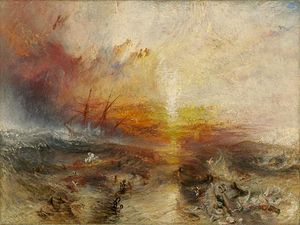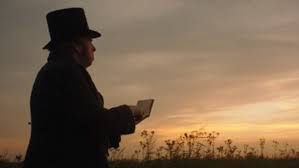Painting the landscape with Mr. Turner
It is with the art historian enthusiasm that I purchased my ticket to see Mike Leigh’s latest movie Mr. Turner. Should it be a movie to be mandatory seen by my students, or my artists attending our painting art classes in Italy or France? After seeing it, maybe yes. I was expecting much more references to the relationship between the seen subject and the final painting. For example, the prevalent effect of empiricism in Britain, largely inspired by Locke, Berkeley, Hume and Burke, all Brits living just before Turner’s birth in 1775. All of them taught us that information about the outside world, the external world outside of ourselves, comes to us through our senses – rationalism maintaining that knowledge finds its roots in reliable knowledge.
However, the movie’s script, if you are very attentive to it, does reflect David Hume’s words that “beauty in things exists in the mind which contemplates them”; and all along the movie we see a contemplative Mr. Turner sketching all the time, analysing sunrises and sunsets, and even being tied to the mast of a ship in the middle of a storm, an examination of his own limits in experiencing fully with all his senses – here an appealing reference to Ulysses tied on the mast listening to the song of the mermaids. But, it would have been more interesting to underline a bit more the relationship between Empiricism and Turner’s works with more references to the canvases such as Rain, Steam and Speed – The Great Western Railway (1844) and of course, below, Slavers Throwing overboard the Dead and Dying—Typhon coming on (1840).
As for the latter famous painting (in Boston today), it would have been important to dedicate at least a few more seconds on the British Anti-Slavery Society’s abolitionist movement (an international movement still in action today) also prevailing at Turner’s time. Though, I did not know that the then young over-protected John Ruskin (in the movie with his mother) bought that painting. Ruskin’s short presence in the film tells us that it was in fact Turner who inspired him to write his book Modern Painter arguing that the beautiful and the sublime are superior to normal landscape painting, or the simple imitation of the seen actual landscape. He proposed to apprehend painting in a new way (just like during our art courses in Tuscany and Provence), and stated that only an excellent painting makes us discover something new every day.
What to retain from Mr. Turner ? Let go! Paint what you really see and really feel, be a visionary and do not fear! Mike Leigh’s latest movie does suggest all this, but maybe in a too discreet fashion. Only a minor flaw.

J.M.W. Turner, also called The Slave Ship (1840). Oil on canvas. 90.8 × 122.6 cm, Museum of Fine Arts, Boston.



Thank You Yves
Timely message for us all …. something for me to keep in mind as Isobel and I prepare for Provence : )
Giuliani !
Having just seen Mr Turner a couple of days ago, a powerful experience, I am enjoying your criticisms of the film’s sociocultural deficits. I did wonder during the film where he found his new vision, his impressionism’s source. But overall as an inspiring example of dedication to his art beyond everything and insight into his personal torments re: women, it was a marvel! Thank you.
He did found his vision in the prevailing philosophical current of the time, Empiricism. In the 1870s, Monet will find refuge in the U.K. for just a few months. He saw Turner’s paintings, returned to France and bingo… you know the rest of the story.By the way, I saw you works. I enjoyed them very much.
Now I did not know that about Monet! But also I did not realize Turner knew so much about science and philosophy. I need to know more about him for sure.